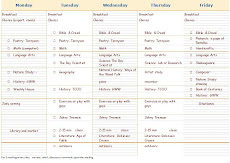Here is a collection of the various logic resources we have around the house. Not included are wonderful games like SET, Robo Rally and plenty of others.

First, there are these:
 These are labelled A through F, roughly corresponding to grades 1 through 6. They are cute and simple -- my kids haven't exactly been enthralled with them, but I bring them out occasionally when we are on a trip or have other things going on that make it difficult to get our regular academics accomplished.
These are labelled A through F, roughly corresponding to grades 1 through 6. They are cute and simple -- my kids haven't exactly been enthralled with them, but I bring them out occasionally when we are on a trip or have other things going on that make it difficult to get our regular academics accomplished. At about sixth grade my kids can usually use the Introductory Logic book from Canon Press. It is formal logic and there a a few glitches in the presentation (at least in the ancient edition I have) but it works well for discussion and only takes a few minutes a day. The Intermediate Logic course is on the right and I haven't ever really gotten through more than a couple of lessons of that with any of my kids.

Here, on the left is the Building Thinking Skills series from Critical Thinking Co. I haven't used them that much, but they cover somewhat the same territory as the little mini-workbooks above -- they are rather pricey, but reproducible, which is nice.
Logic, Anyone? has those word logic puzzles like the ones where you try to determine who is sitting next to whom on an airplane. They are about 6th grade level and pretty challenging.
Then there is the Traditional Logic series -- I actually have volumes 1 and 2 though only 2 is shown here. I have found it reasonable to start volume 1 anywhere between 7th and 11th grade. If you start with an older student, you can do each volume in a semester. Memoria Press has another logic book -- Material Logic -- which I do not have yet except on my wish list.

Here are two miscellaneous books. Logic for Beginners is a simple modern-logic type book -- I went through some of the puzzles with my oldest when he was in sixth grade but haven't really used it since. With Good Reason is a college informal logic text and quite good. My second son went through it and seemed to get a lot out of it. He still can pick out a fallacy at ten paces.
 Finally, here are a few books that aren't primarily logic, but have a logic subsection or component. Jacob's Geometry starts off with a brief logic course. Classical WRiting: Diogenes is a writing program meant to be used along with Traditional Logic.
Finally, here are a few books that aren't primarily logic, but have a logic subsection or component. Jacob's Geometry starts off with a brief logic course. Classical WRiting: Diogenes is a writing program meant to be used along with Traditional Logic. The one on the left, Process and Thought in Composition, is a college textbook by Frank D'Angelo who wrote the textbook on the progymnasmata called Classical Composition. POTIC has a chapter on enthymemes, which sort of skirt the border between logic and rhetoric.

I haven't exactly decided what to use with whom this year, except that Sean, my 14 year old, will probably go through Traditional Logic 1 (he started it last year) and also do a bit of CW: Diogenes. I may use some of the Building Thinking SKills with Kieron, my 11 year old, and possibly also a bit of Introductory Logic. I'd like to get him interested in logic puzzles and concepts since he has one of those types of minds (likes Rubik's Cube, SET and things like that).



I cant get Tink interested in anything like that. We have to take state tests as homeschoolers and I noticed there were some questions on there that had to do with logic. Tink will just have to skip them I guess!
ReplyDelete